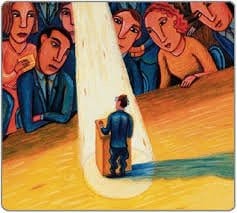When I was prosecuting habitually barking dog cases on a 3rd-year bar card, I wondered when my fear of jury trials would ever end. That was 1989. To this day I remain uneasy and agitated the morning a trial begins. In fact, I’m miserable. Until I speak my first words during voir dire, I’m frightened. I fear the beginning of my opening statement. I fear an imminent cross-examination for which I am properly prepared. I fear the start of a closing argument. I fear receiving a verdict. For the most part, I fear every aspect of a trial. Though I’ve trained myself to appear confident on the outside, I’m still afraid inside. And I’m reluctant to admit the best part of a trial is its conclusion.
1989. To this day I remain uneasy and agitated the morning a trial begins. In fact, I’m miserable. Until I speak my first words during voir dire, I’m frightened. I fear the beginning of my opening statement. I fear an imminent cross-examination for which I am properly prepared. I fear the start of a closing argument. I fear receiving a verdict. For the most part, I fear every aspect of a trial. Though I’ve trained myself to appear confident on the outside, I’m still afraid inside. And I’m reluctant to admit the best part of a trial is its conclusion.
My prompt this month came from Kevin Davis’ article “How Lawyers Can Turn Fear Into an Ally” published in the November 2015 online edition of the ABA Journal. Kevin’s thesis was that fear is common among trial attorneys. But these same lawyers could learn to transform fear into an advantage. He described how lawyers fear not making good impressions or fear losing control of their case. They were fearful of looking foolish or appearing weak. They feared for their reputation. Lawyers were frightened by adverse rulings. They feared rejection by the jury. They dreaded their opponent. They feared losing. Kevin noted those fears might be realistic or even illogical. He observed that “fear had become part of the legal culture because lawyers, like soldiers, often feel engaged in battle.” “You’re dealing with an enemy that’s shooting back and you have to anticipate their moves and strategies.” In other words, there were people out there who actually got paid to get in our way, find our mistakes, and make us look bad.
Why share my foibles with colleagues, friends, and adversaries? Frankly, I hoped to inspire someone. Fear is a thinly disguised blessing. But it unnecessarily obstructs us from performing well, producing good results for clients, earning more income, or experiencing greater career satisfaction. At its worst, fear is debilitating and imprisoning. It can scuttle our effectiveness as trial advocates. It can hobble the successful administration of our law practice. Fear can even impede the sound application of our professional judgment. Consequently, the sooner we learn to forge our fears into constructive advantages, the sooner we unmask the blessing waiting just under the surface.
Necessarily, fashioning one’s fear into an edge becomes a powerful tool. A tool utilized for working harder than your opponent. An edge for uncovering clues that might unravel the prosecutor’s case. Rather than permitting fear to trigger fatigue, obsessive-compulsive behaviors or procrastination, it’s channelled into energy to prepare. One of my irrational aversions is never wanting to look like an idiot . . . especially in front of prosecutors, judges, court reporters, colleagues, and others who know a mistake when they see one. But understanding the facts and law better than our adversary guards us from ever looking like idiots. We have nothing to fear, win or lose. We can pride ourselves for knowing the case better than anyone else in the courtroom and for accepting the inevitability of making mistakes. And we can even teach ourselves to appreciate the value of learning from those mistakes.
Since realizing my fear of trying cases would never go away, I learned to accept it. Not just the feeling miserable part. But accepting fear as a necessary component of doing my best. The fear is temporary. In fact, once that dreaded cross-examination actually begins the trepidation turns to excitement, anticipation and even a robust sense of accomplishment. Fear keeps us on our toes. To this end, we shouldn’t permit apprehension and anxiety to derail career satisfaction or a satisfying income. Rather, we can channel fear to productive use. Defense lawyers are compelled to overcome failure almost every day. Coping with our fears is just another part of it.
Stephen Gustitis is a criminal defense lawyer in Bryan-College Station. He is Board Certified in Criminal Law by the Texas Board of Legal Specialization. He is also a husband, father, and retired amateur bicycle racer.


